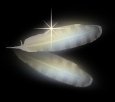![]()
![]() Memorial to
Tanya Burr, 1981-2002
Memorial to
Tanya Burr, 1981-2002 ![]()
![]()

![]()

![]()

![]()
![]()
![]()
![]()
![]()
![]()
![]()
![]()
![]()
![]()
![]()
![]()
![]()
![]() Twinkle
Twinkle Little Star
Twinkle
Twinkle Little Star![]()
![]() How I wonder
where you are...
How I wonder
where you are...![]()
Part One (of Three)
I don't know why I am writing this page. Probably because I found this neat background and its stars and moon on the internet, and felt like 'doing something' with it.
Its now 21 months since Tanya's death. I visit the cemetery about twice a week nowadays - usually on the spur of the moment, but in summer also to make sure the pansies growing on her grave are watered. Probably before too much longer, the little garden will have to go, as only lawns are allowed in lawn cemeteries! But in the meantime it thrives.
I, like a number of other grieving people with relatives at the cemetery, have probably just about become part of the furniture there. Most times I look at the other graves too, to see what has changed since my last visit - new headstones, new occupants, read the visitors' book in the lovely new shelter room right opposite Tanya's grave (donated by the husband of a woman buried nearby) and so on.
By this point I know a number of the other 'regulars' and I guess we probably keep a caring eye on a number of the other graves. As ACC gives money toward the funerals of victims of accidents (including murders), many of those buried nowadays (as opposed to the cheaper cremations) seem to have died tragically and young. So we know the stories of some of those young people whose lives had been so tragically cut short through various means. Tanya is therefore not only surrounded by the 'old fogies' as she would have said.
There are three other murder victims that I know of in the section of the cemetery where Tanya is. One young guy I don't recall the name of right now, was stabbed to death in Linton Prison. That connection must make this tragedy all the harder for his family to deal with. The next in chronological order was 17-year-old mother of two, Barbara Miller, who was badly beaten and left to die in their home by her 20-year-old boyfriend on 24 March 2002. He ended up sentenced to ten years in prison for manslaughter, and must stay there at least six years. He has since been convicted of other very serious offences including rape, and these suggest that he should stay locked up for much longer.
Barbara doesn't have a headstone yet - something that I know from a media interview some time back upsets her family. At least the grave now has proper grass growing on it instead of just a few straggly weeds. So it looks much tidier for when her family and friends visit now. A couple of us with loved ones nearby discretely assisted in that direction over the months because we felt sorry for her - and them.

The third murder victim buried close to Tanya is Detective Constable Duncan Taylor, who was shot dead in the line of duty on 5 July 2002 by a 17-year-old youth who had been upset after breaking up with his girlfriend. Three days after Tanya's death, Taylor's killer, Daniel Luff (who had pleaded guilty from the start) was sentenced to life imprisonment with a 17 year non-parole period. Taylor's wife and I were both left feeling cheated by the lack of resulting trials - despite all the (theoretically) kindly comments about how we had been 'saved' from having to go through one by the offender chosing to plead guilty. From our conversation on the subject, our shared view was that the offenders deserved to suffer the indignity of a trial.
When sentencing Wharekura for Tanya's murder many months later, Justice Neazor cited the Luff sentencing in terms of whether any circumstances on the part of the murderer might mean that a 17-year non-parole period was "manifestly unjust", and if so this case law allowed him to adjust the resulting sentence accordingly. This Justice Neazor went on to use to reduce Wharekura's non-parole period from 17 years to 14 years. He said this was due to Wharekura's supposed 'early guilty plea' that we somehow managed not to notice over all those many months and many drives to Rotorua. Note that both got 'life imprisonment', just that in New Zealand, 'life' does not mean 'the rest of their life'. The non-parole period means that they may not apply for parole for this length of time, but it does not mean they will actually be granted it at that time.
I have to wonder what non-parole period Luff would have received if his judge had instead been using Tanya's judge's comments and rulings as a sentencing guide..
Potentially getting injured and perhaps even killed is unfortunately a risk police must endure in the course of their employment, whereas a young girl (or a cop for that matter) sitting at home alone watching TV does not expect to suddenly get murdered by a stranger knocking at their door. I agree with Luff's non-parole period, but it is hard knowing that his case was used to reduce Wharekura's sentence - and by so much! One murder occurred in a 'hot blood' situation, while the other was exactly the opposite from the victim's point of view. Tanya had no way to know that she was in any danger until the last seconds of her life. Neither victim nor their respective families obviously got a say in this matter. I suspect that is why they invented judges!

Arnold Thomas, my Dad's closest mate of about 45 years (and they also knew of each other well before that) is also now buried close by. Tanya would have appreciated his close proximity as she knew him all her life. I am sure he would have felt the same way - as Dad also would have. He had lost his younger brother and nephew to a very famous double murder in Wellington in the early 1990s - and his last conversation with one of my brothers two weeks before his sudden death included about the bluntest statement anyone could make about what to do with Tanya's murderer.
Such thoughts were totally out of character for this very humble, very Christian gentleman - but they reflected one who knew personally exactly what we were going through. He also knew how Dad, who died in 1999, would have been feeling had he lived to know what fate was to befall his eldest granddaughter.
Two weeks after Arnold's funeral - and as a result of it - I took a framed portait of my kids taken in his old hayshed in about 1993, to hold while sitting through the sentencing. At Tanya's funeral, he was perhaps the only one present who truly knew what we were going through. I remember seeing him as I walked out of the hall following the coffin, and giving him a huge and very special hug. That was the last time I was fated to see him.
I am told that lots of people look at Tanya's grave as they pass. Its headstone tends to attact interest - which is good. I guess she is probably the only occupant of the entire cemetery who has their own website - but that fact isn't advertised on the grave.

Those of us who are, or that should be 'were' I guess, especially close to Tanya and knew how she would react to various things, constantly drift back to imagining how how she would have reacted to different things that have happened since her death. Certainly some things would have greatly amused her, while others would have enormously shocked and distressed her. So I think of her laughing, I think of her crying, and I think of her cringing in horror at various things that have happened.
She guarded her privacy carefully, but at other times fought back determindly. She was extremely shy and also extremely bold. So she was a real contradiction. She certainly could put on a false front to protect her insecurities, and so how different people found her could vary widely. The out-spoken and sometimes stroppy version of Tanya could be a very different person to the 'real' one that her closest friends knew. Similarly, the meek, mild and very well mannered Tanya that some knew (and not necessarily her mum in this case), might just as surely be different to how others imagined her to be.
In other words, Tanya's personality perhaps could best be summed up as aiming to protect the fragile young girl within, by acting at times just a little bit tyrannical and/or to be 'approached with care'- and sometimes even by acting just a little bit thick. She hid behind this aura, but it was not the real her. She had very low self-esteem and believed herself unworthy of the good things in life. She seriously 'sold herself short' as they say. She had no real comprehension of how much she actually had going for her, and our trip overseas was to in part counter that.
I strongly believe - from my conversations with her in the three days before her death - that our trip and the simple fact that we had taken it, had changed her life and her outlook on life. She had gained the benefit of some of the things we had lacked during her growing up - especially money to spend on trivia like holidays - and she had found a whole new world that she was a complete part of. It was a very confident and in-control young woman who returned from Europe that day. Oh how different things would have been thereafter.
And then she was dead...

![]()
![]()
![]()
![]()
![]()
![]()
![]()
![]()
![]()
![]()
![]()